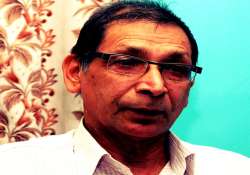Nepal Maoist party opposes Indian investment in hydropower sector
Kathmandu: A hardline Maoist faction in Nepal Tuesday voiced its opposition to foreign investment in Nepal's hydropower sector, particularly targeting Indian investment. Addressing a press conference here, Mohan Baidhya aka Kiran, leader of the Communist

Kathmandu: A hardline Maoist faction in Nepal Tuesday voiced its opposition to foreign investment in Nepal's hydropower sector, particularly targeting Indian investment.
Addressing a press conference here, Mohan Baidhya aka Kiran, leader of the Communist Party of Nepal-Maoist, said his party would stage protest rallies Thursday against such investment from outside the country.
Though the party's position on opposing Indian investment in Nepal's hydropower sector is not a new one, the latest move has raised a question mark over the future of Indian investment in Nepal, especially when two Indian firms are all set to sign a Power Development Agreement (PDA) with the Nepal government.
Time and again, India has been reminding Nepal at the top level that all Indian investments in Nepal should be secured and protected. The two sides had signed the Bilateral Investment Protection and Promotion Agreement (BIPPA) some two years back after Indian investors in Nepal were threatened by Maoists.
Baidhya said the agitation would be against the Upper Karnali, Koshi High Dam Project, Upper Marsyangadi and Arun III projects. All these four projects have Indian investment and are at various stages of development.
GMR India is developing Upper Karnali (900 MW) and Upper Marsyangadi (600 MW) while the Koshi High Dam, which is multipurpose in nature, is directly handled by the Indian government.
The Sutlej Jal Vidyut Nigam Ltd (SJVNL) is developing Arun III (900 MW).
Unveiling the programme of action, Baidhya said his party would organise protest programmes Thursday in district headquarters where these projects are located.
The party's water resources wing will also organise a talk programme on the same day in Kathmandu under the theme of “water resources and national treason”.
“These projects are more in favour of India than Nepal. We will obstruct their implementation until the unequal agreement is scrapped and a fresh one is signed,” Baidhya said.
Earlier too, the party had called upon the Nepal government to scrap the agreement allowing Indian firms to invest in Nepal's hydropower sector.
The party always relates Indian investment in hydropower sector as an issue of nationality.
“Our party is of the opinion that until such unequal agreements, treaties and contracts are corrected, the projects should not be constructed,” said Baidhya.
He also clarified that the party has been playing a creative role in the management and operation of the projects that are constructed by placing national interest uppermost.
Addressing a press conference here, Mohan Baidhya aka Kiran, leader of the Communist Party of Nepal-Maoist, said his party would stage protest rallies Thursday against such investment from outside the country.
Though the party's position on opposing Indian investment in Nepal's hydropower sector is not a new one, the latest move has raised a question mark over the future of Indian investment in Nepal, especially when two Indian firms are all set to sign a Power Development Agreement (PDA) with the Nepal government.
Time and again, India has been reminding Nepal at the top level that all Indian investments in Nepal should be secured and protected. The two sides had signed the Bilateral Investment Protection and Promotion Agreement (BIPPA) some two years back after Indian investors in Nepal were threatened by Maoists.
Baidhya said the agitation would be against the Upper Karnali, Koshi High Dam Project, Upper Marsyangadi and Arun III projects. All these four projects have Indian investment and are at various stages of development.
GMR India is developing Upper Karnali (900 MW) and Upper Marsyangadi (600 MW) while the Koshi High Dam, which is multipurpose in nature, is directly handled by the Indian government.
The Sutlej Jal Vidyut Nigam Ltd (SJVNL) is developing Arun III (900 MW).
Unveiling the programme of action, Baidhya said his party would organise protest programmes Thursday in district headquarters where these projects are located.
The party's water resources wing will also organise a talk programme on the same day in Kathmandu under the theme of “water resources and national treason”.
“These projects are more in favour of India than Nepal. We will obstruct their implementation until the unequal agreement is scrapped and a fresh one is signed,” Baidhya said.
Earlier too, the party had called upon the Nepal government to scrap the agreement allowing Indian firms to invest in Nepal's hydropower sector.
The party always relates Indian investment in hydropower sector as an issue of nationality.
“Our party is of the opinion that until such unequal agreements, treaties and contracts are corrected, the projects should not be constructed,” said Baidhya.
He also clarified that the party has been playing a creative role in the management and operation of the projects that are constructed by placing national interest uppermost.